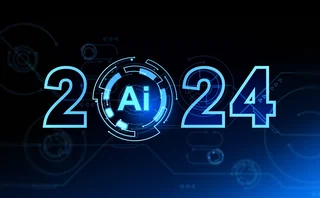The Internet of Things and the Speed of Evolution
The Internet of Things is going to have a profound effect on technology.

You've likely heard it many times before, but the speed of innovation can be dizzying. When my dad started out working in data centers, he used electronic assembly machines that were basically glorified keypunch adding machines. Then mainframes took hold for the next couple of decades and in the 1990s servers became popular.
With each shift, firms had to realign their disaster recovery and back-up processes, while the way that they analyzed and interacted with information also changed. And with the advent and popularity of cloud computing, it seems that there's a new "paradigm shift" every year or two.
Capital markets firms are notoriously risk averse when it comes to the bleeding edge of technological revolutions, which is why I was so keen to write about the Internet of Things (IoT) for the July issue of Waters and how it might relate to our industry.
The IoT is where one smart device/sensor takes in information and talks to another device to effect change or alert someone to do something. Right now, there aren't many examples where banks or hedge funds would invest in IoT hardware.
After chatting with several industry experts, the best examples I could come up with would be a commodities trader managing the humidity in his/her physical grain assets with an IoT sensor, or a muni-bond trader keeping track of mall traffic in a particular city. IoT devices can also be used to monitor a bank's workforce and defend against insider trading or the stealing of information. And large organizations can use IoT sensors to improve the efficiency of their data centers and reduce costs, thereby freeing up capital to spend on more innovative trading platforms. But this is all hypothetical.
According to IBM, 90 percent of all data generated by devices such as smartphones, tablets and appliances is never analyzed.
The Real Promise
Where the IoT will have a profound effect, and which I get into in far greater detail in my feature, is when it comes to the information that these devices will collect and spew back to other devices. The ability to collect, sort and tag, and ─ most importantly ─ analyze and then act on that data ... well, there's a vast world of potential here.
According to IBM, 90 percent of all data generated by devices such as smartphones, tablets, connected vehicles and appliances is never analyzed or acted on. And as much as 60 percent of this data begins to lose value within milliseconds of being generated. As a result, IBM is going all-in on the IoT front to help address the problem. In March, Big Blue announced that it would invest $3 billion in the next four years to establish a new IoT unit.
In addition to the data and analytics platforms that CIOs and CTOs should be thinking about already ─ after all, collecting, tagging and analyzing data should not be a new concept on Wall Street ─ technology heads also need to consider this: Many of the vendors they work with are going to evolve along with IoT, which could change the business models they're employing.
"They may be used to selling a product, they can sell a product or a service, or they can sell a product and a service," says Robin Duke-Woolley, CEO of Beecham Research, which has been covering the IoT evolution from its precursor, M2M (Machine-2-Machine).
Embedded Sensors
Take, for example, a jet engine maker like Rolls-Royce. The company is embedding IoT sensors in its latest engines to monitor their condition in real time with the view to automatically send replacement parts to an aircraft's next destination to reduce downtime and improve safety conditions. Duke-Woolley says the data being collected by the sensors can also be used (and sold) to create reports.
The IoT might not seem like a pressing issue right now on Wall Street. But be assured that IoT is going to have a profound effect on IT in the coming years. And, much like the advent of cloud computing, can you afford to be on the outskirts of the revolution?
Random Thoughts
● Consider this: If you were born in 1967 or later, you've seen the United States win two World Cups to England's zero. Everybody with me, now: USA! USA! USA!
● On a side note, Sunday's World Cup final was the second-most-watched soccer match in US-television history, behind only last year's Germany-Argentina WC final. It is the fifth-most watched non-NFL sporting event in 2015, thus far. Well done, ladies.
● I've found Season 2 of "True Detective" to be enjoyable. Somebody once said that Season 1 was the closest thing to reading a book on TV. This was not meant as a knock; it was to show that it was a slow, beautiful build. Well, Season 2 is a bit slower of a read, but I think that the payoff is going to be great. Kind of like "A Farewell to Arms" -- slow, slow build, but BAM...that ending.
My only complaint with Season 2 is that everyone is whisper talking. I have to jack my surround sound up to 50 just to understand what they hell everyone is saying to one another. But, then again, I'm old and hard of hearing.
● How NASCAR Sprint Cup driver Austin Dillon survived this crash at the Coke Zero 400 at Dayton is just beyond me. Not only did he survive, but he was quickly out of the car and walking around. And no on in the audience was severely hurt, too! Just crazy.
● Italian security firm Hacking Team was breached recently, with hackers stealing 400GB of data from its servers, as well as hacking into its Twitter account and posting screenshots of company emails, according to Incisive's sibling publication, V3.
This is on Hacking Team's "about" page: "Here in [sic] HackingTeam we believe that fighting crime should be easy: we provide effective, easy-to-use offensive technology to the worldwide law enforcement and intelligence communities. Technology must empower, not hinder."
Maybe fighting crime isn't so easy, after all.
Also, according to Wired, Hacking Team might have been involved in some unethical practices, so this hack might be more about whistleblowing than trying to destroy the reputation of a noble crime fighter.
Only users who have a paid subscription or are part of a corporate subscription are able to print or copy content.
To access these options, along with all other subscription benefits, please contact info@waterstechnology.com or view our subscription options here: http://subscriptions.waterstechnology.com/subscribe
You are currently unable to print this content. Please contact info@waterstechnology.com to find out more.
You are currently unable to copy this content. Please contact info@waterstechnology.com to find out more.
Copyright Infopro Digital Limited. All rights reserved.
As outlined in our terms and conditions, https://www.infopro-digital.com/terms-and-conditions/subscriptions/ (point 2.4), printing is limited to a single copy.
If you would like to purchase additional rights please email info@waterstechnology.com
Copyright Infopro Digital Limited. All rights reserved.
You may share this content using our article tools. As outlined in our terms and conditions, https://www.infopro-digital.com/terms-and-conditions/subscriptions/ (clause 2.4), an Authorised User may only make one copy of the materials for their own personal use. You must also comply with the restrictions in clause 2.5.
If you would like to purchase additional rights please email info@waterstechnology.com
More on Emerging Technologies
Waters Wavelength Ep. 300: Reflecting on humble beginnings
It is our 300th episode! Tony and Shen reflect on how it all started.
An inside look: How AI powered innovation in the capital markets in 2024
From generative AI and machine learning to more classical forms of AI, banks, asset managers, exchanges, and vendors looked to large language models, co-pilots, and other tools to drive analytics.
Asset manager Saratoga uses AI to accelerate Ridgeline rollout
The tech provider’s AI assistant helps clients summarize research, client interactions, report generation, as well as interact with the Ridgeline platform.
LSEG rolls out AI-driven collaboration tool, preps Excel tie-in
Nej D’Jelal tells WatersTechnology that the rollout took longer than expected, but more is to come in 2025.
The Waters Cooler: ’Tis the Season!
Everyone is burned out and tired and wants to just chillax in the warm watching some Securities and Exchange Commission videos on YouTube. No? Just me?
It’s just semantics: The web standard that could replace the identifiers you love to hate
Data ontologists say that the IRI, a cousin of the humble URL, could put the various wars over identity resolution to bed—for good.
T. Rowe Price’s Tasitsiomi on the pitfalls of data and the allures of AI
The asset manager’s head of AI and investments data science gets candid on the hype around generative AI and data transparency.
As vulnerability patching gets overwhelming, it’s no-code’s time to shine
Waters Wrap: A large US bank is going all in on a no-code provider in an effort to move away from its Java stack. The bank’s CIO tells Anthony they expect more CIOs to follow this dev movement.








